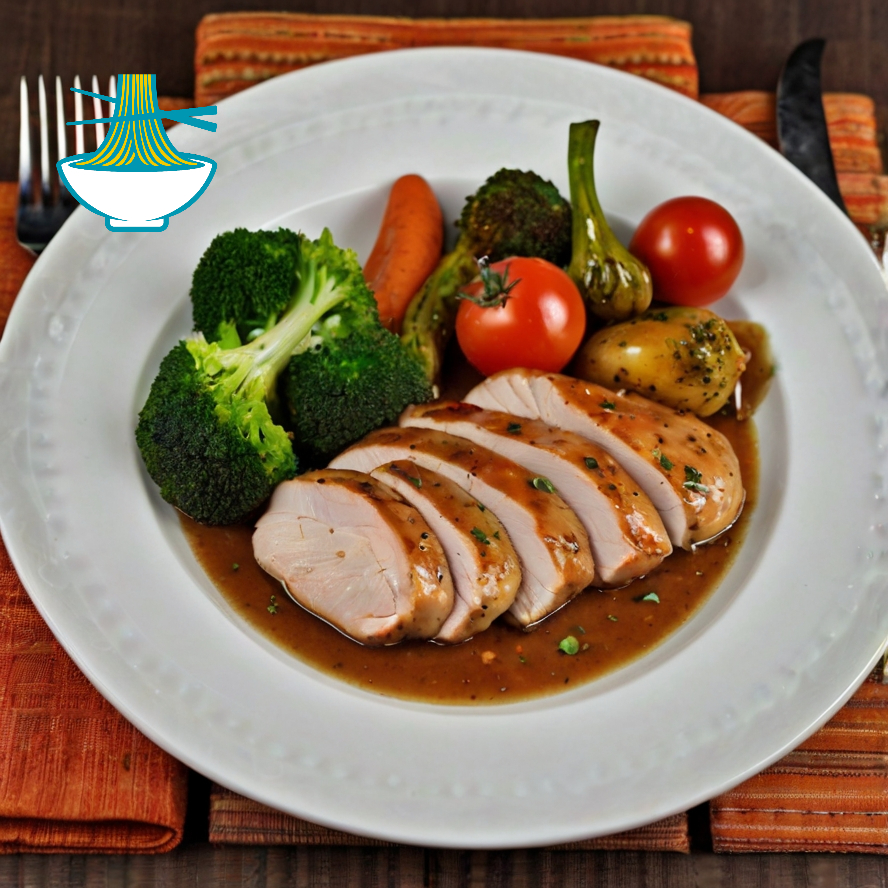Discover the perfect recipe for Morčacie Prsia, a delectable dish featuring tender turkey breasts often served with a medley of vegetables and rich gravy. Ideal for a comforting family dinner, this recipe combines juicy turkey with savory flavors to create a mouthwatering meal. Learn how to make this traditional favorite with step-by-step instructions and tips for achieving the perfect tenderness and flavor.
Ingredients:
- 4 turkey breasts (boneless and skinless)
- 2 tablespoons olive oil
- 1 medium onion, finely chopped
- 3 cloves garlic, minced
- 2 carrots, sliced
- 2 celery stalks, sliced
- 1 cup chicken or vegetable broth
- 1/2 cup white wine (optional)
- 2 tablespoons all-purpose flour
- 1 tablespoon dried thyme
- 1 tablespoon dried rosemary
- Salt and pepper to taste
- Fresh parsley for garnish
Instructions:
Prepare the Turkey Breasts: Season the turkey breasts with salt, pepper, thyme, and rosemary.
Sear the Turkey: Heat olive oil in a large skillet over medium-high heat. Add the turkey breasts and cook for about 5-6 minutes on each side, or until golden brown. Remove from the skillet and set aside.
Cook the Vegetables: In the same skillet, add chopped onion, garlic, carrots, and celery. Sauté for 5-7 minutes until vegetables are softened.
Make the Gravy: Sprinkle flour over the vegetables and stir to coat. Cook for 1-2 minutes to remove the raw flour taste. Gradually add the chicken or vegetable broth and white wine, stirring constantly to avoid lumps. Bring to a simmer and cook for 3-4 minutes until the sauce thickens.
Combine and Simmer: Return the turkey breasts to the skillet, spooning some of the gravy over them. Reduce heat to low, cover, and let simmer for 20-25 minutes, or until the turkey is cooked through and tender.
Serve: Garnish with fresh parsley and serve hot with your favorite side dishes.
Enjoy your Morčacie Prsia with a side of mashed potatoes or rice for a complete and satisfying meal!
Nutritional values
Turkey Breasts (4 boneless and skinless):
- Approximate Nutritional Values (per 100 grams):
- Calories: 135
- Protein: 30g
- Carbohydrates: 0g
- Fat: 1g
Benefits: High in lean protein, low in fat, and rich in essential vitamins and minerals such as B vitamins and selenium. Supports muscle health and metabolism.
Olive Oil (2 tablespoons):
- Approximate Nutritional Values (per 100 grams):
- Calories: 884
- Protein: 0g
- Carbohydrates: 0g
- Fat: 100g
Benefits: Provides healthy monounsaturated fats and antioxidants. Supports heart health and may reduce inflammation.
Onion (1 medium, finely chopped):
- Approximate Nutritional Values (per 100 grams):
- Calories: 40
- Protein: 1g
- Carbohydrates: 9g
- Fat: 0.1g
Benefits: Adds flavor and nutrients such as vitamin C and antioxidants. Supports heart health and has anti-inflammatory properties.
Garlic (3 cloves, minced):
- Approximate Nutritional Values (per 100 grams):
- Calories: 149
- Protein: 6g
- Carbohydrates: 33g
- Fat: 0.5g
Benefits: Known for its medicinal properties, garlic can help reduce blood pressure, cholesterol levels, and boost the immune system.
Carrots (2, sliced):
- Approximate Nutritional Values (per 100 grams):
- Calories: 41
- Protein: 1g
- Carbohydrates: 10g
- Fat: 0.2g
Benefits: Rich in vitamins A and C, and antioxidants. Supports eye health and immune function.
Celery Stalks (2, sliced):
- Approximate Nutritional Values (per 100 grams):
- Calories: 16
- Protein: 1g
- Carbohydrates: 3g
- Fat: 0.2g
Benefits: Provides fiber, vitamins, and minerals. Supports digestive health and has anti-inflammatory properties.
Chicken or Vegetable Broth (1 cup):
- Approximate Nutritional Values (per cup, 240 ml):
- Calories: 30 (chicken broth)
- Protein: 4g
- Carbohydrates: 1g
- Fat: 1g
Benefits: Adds flavor and some nutrients. Typically low in calories and may provide minerals and electrolytes.
White Wine (1/2 cup, optional):
- Approximate Nutritional Values (per 100 ml):
- Calories: 82
- Protein: 0g
- Carbohydrates: 2g
- Fat: 0g
Benefits: Adds flavor and complexity to the dish. Contains antioxidants but should be used in moderation.
All-Purpose Flour (2 tablespoons):
- Approximate Nutritional Values (per 100 grams):
- Calories: 364
- Protein: 10g
- Carbohydrates: 76g
- Fat: 1g
Benefits: Used for thickening. Adds calories and carbohydrates.
Dried Thyme (1 tablespoon):
- Approximate Nutritional Values (per 100 grams):
- Calories: 101
- Protein: 5g
- Carbohydrates: 25g
- Fat: 7g
Benefits:Adds flavor and has antioxidants. May support digestion and have antimicrobial properties.
Dried Rosemary (1 tablespoon):
- Approximate Nutritional Values (per 100 grams):
- Calories: 131
- Protein: 3g
- Carbohydrates: 22g
- Fat: 6g
Benefits: Adds flavor and has antioxidants. May aid digestion and have anti-inflammatory properties.
Salt (to taste):
- Approximate Nutritional Values (per 100 grams):
- Calories: 0
- Protein: 0g
- Carbohydrates: 0g
- Fat: 0g
Benefits: Enhances flavor. Use in moderation to avoid excessive sodium intake.
Pepper (to taste):
- Approximate Nutritional Values (per 100 grams):
- Calories: 251
- Protein: 10g
- Carbohydrates: 64g
- Fat: 3g
Benefits: Adds flavor and contains antioxidants. May aid digestion and have anti-inflammatory properties.
Fresh Parsley (for garnish):
- Approximate Nutritional Values (per 100 grams):
- Calories: 36
- Protein: 3g
- Carbohydrates: 6g
- Fat: 0.8g
Benefits: Adds fresh flavor and is rich in vitamins A, C, and K. Contains antioxidants and may aid digestion.
This turkey breast recipe combines lean protein with a variety of vegetables and herbs, making it a nutritious and flavorful meal option.


Comments